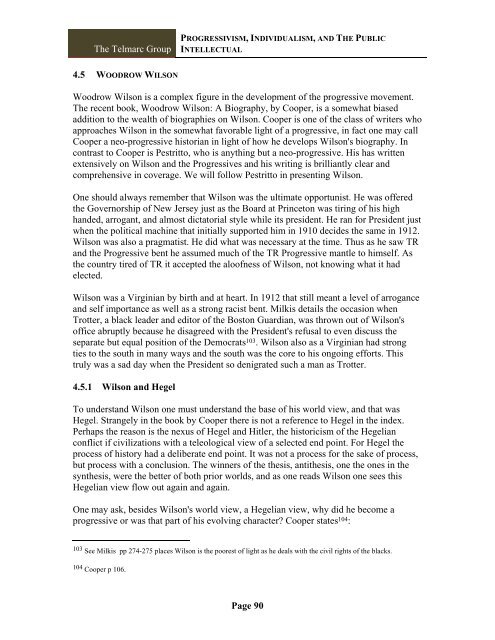progressivism, individualism, and the public ... - Telmarc Group
progressivism, individualism, and the public ... - Telmarc Group
progressivism, individualism, and the public ... - Telmarc Group
Create successful ePaper yourself
Turn your PDF publications into a flip-book with our unique Google optimized e-Paper software.
The <strong>Telmarc</strong> <strong>Group</strong><br />
4.5 WOODROW WILSON<br />
PROGRESSIVISM, INDIVIDUALISM, AND THE PUBLIC<br />
INTELLECTUAL<br />
Woodrow Wilson is a complex figure in <strong>the</strong> development of <strong>the</strong> progressive movement.<br />
The recent book, Woodrow Wilson: A Biography, by Cooper, is a somewhat biased<br />
addition to <strong>the</strong> wealth of biographies on Wilson. Cooper is one of <strong>the</strong> class of writers who<br />
approaches Wilson in <strong>the</strong> somewhat favorable light of a progressive, in fact one may call<br />
Cooper a neo-progressive historian in light of how he develops Wilson's biography. In<br />
contrast to Cooper is Pestritto, who is anything but a neo-progressive. His has written<br />
extensively on Wilson <strong>and</strong> <strong>the</strong> Progressives <strong>and</strong> his writing is brilliantly clear <strong>and</strong><br />
comprehensive in coverage. We will follow Pestritto in presenting Wilson.<br />
One should always remember that Wilson was <strong>the</strong> ultimate opportunist. He was offered<br />
<strong>the</strong> Governorship of New Jersey just as <strong>the</strong> Board at Princeton was tiring of his high<br />
h<strong>and</strong>ed, arrogant, <strong>and</strong> almost dictatorial style while its president. He ran for President just<br />
when <strong>the</strong> political machine that initially supported him in 1910 decides <strong>the</strong> same in 1912.<br />
Wilson was also a pragmatist. He did what was necessary at <strong>the</strong> time. Thus as he saw TR<br />
<strong>and</strong> <strong>the</strong> Progressive bent he assumed much of <strong>the</strong> TR Progressive mantle to himself. As<br />
<strong>the</strong> country tired of TR it accepted <strong>the</strong> aloofness of Wilson, not knowing what it had<br />
elected.<br />
Wilson was a Virginian by birth <strong>and</strong> at heart. In 1912 that still meant a level of arrogance<br />
<strong>and</strong> self importance as well as a strong racist bent. Milkis details <strong>the</strong> occasion when<br />
Trotter, a black leader <strong>and</strong> editor of <strong>the</strong> Boston Guardian, was thrown out of Wilson's<br />
office abruptly because he disagreed with <strong>the</strong> President's refusal to even discuss <strong>the</strong><br />
separate but equal position of <strong>the</strong> Democrats 103 . Wilson also as a Virginian had strong<br />
ties to <strong>the</strong> south in many ways <strong>and</strong> <strong>the</strong> south was <strong>the</strong> core to his ongoing efforts. This<br />
truly was a sad day when <strong>the</strong> President so denigrated such a man as Trotter.<br />
4.5.1 Wilson <strong>and</strong> Hegel<br />
To underst<strong>and</strong> Wilson one must underst<strong>and</strong> <strong>the</strong> base of his world view, <strong>and</strong> that was<br />
Hegel. Strangely in <strong>the</strong> book by Cooper <strong>the</strong>re is not a reference to Hegel in <strong>the</strong> index.<br />
Perhaps <strong>the</strong> reason is <strong>the</strong> nexus of Hegel <strong>and</strong> Hitler, <strong>the</strong> historicism of <strong>the</strong> Hegelian<br />
conflict if civilizations with a teleological view of a selected end point. For Hegel <strong>the</strong><br />
process of history had a deliberate end point. It was not a process for <strong>the</strong> sake of process,<br />
but process with a conclusion. The winners of <strong>the</strong> <strong>the</strong>sis, anti<strong>the</strong>sis, one <strong>the</strong> ones in <strong>the</strong><br />
syn<strong>the</strong>sis, were <strong>the</strong> better of both prior worlds, <strong>and</strong> as one reads Wilson one sees this<br />
Hegelian view flow out again <strong>and</strong> again.<br />
One may ask, besides Wilson's world view, a Hegelian view, why did he become a<br />
progressive or was that part of his evolving character? Cooper states 104 :<br />
103 See Milkis pp 274-275 places Wilson is <strong>the</strong> poorest of light as he deals with <strong>the</strong> civil rights of <strong>the</strong> blacks.<br />
104 Cooper p 106.<br />
Page 90












